#land analysis
Text
WAIT so yall know this panel of eridan right.
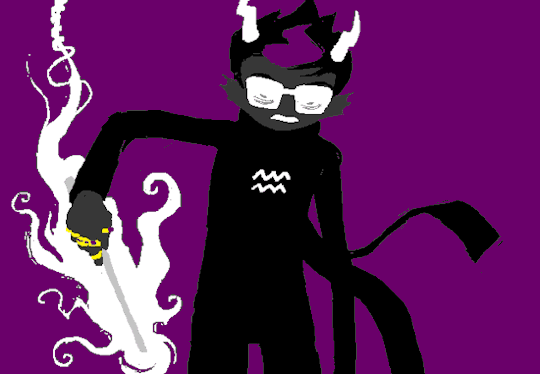
ive seen a lot of ppl comparebit to grimdark, but aside from it being debunked by the Beast, theres also notable differences
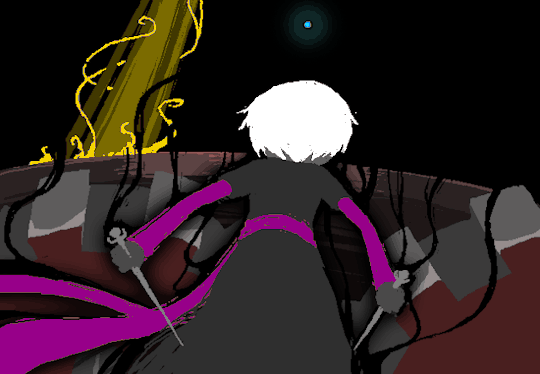

grimdark style is characterized by a whispy black outline, while in the above panel, eridan's magic outline is noticably white

so. what else have we seen drawn in a black silhouette with a glowing white outline?
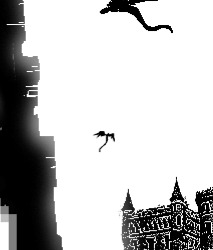
THE FUCKING ANGELS!!!!
BUT THERES MORE
the angels dont always look like that, in fact they only ever appear that way on lowaa
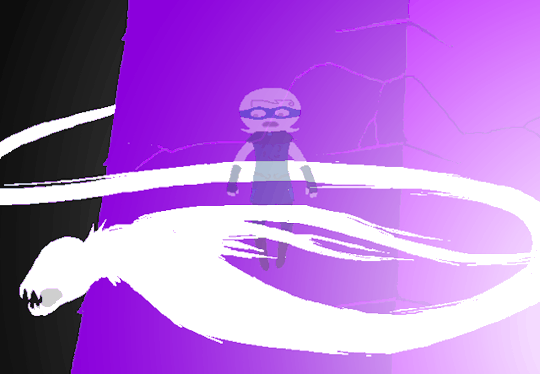

THE HOPE FIELD AROUND LOWAA OBSCURES THE ANGELS
BECAUSE. ERIDAN PERCIEVES THEM AS A THREAT. BECAUSE HIS BELIEF IN HIS WAYS PREVENTED HIM FROM SEEING THE SITUATION CLEARLY
AND. IN THE END. THAT STRICT BELIEF DELUDES HIM TO THE POINT OF KILLING HIS FRIENDS WITH HOPE MAGIC. BECAUSE TO HIM THEY WERE ALL ALREADY DEAD. BECAUSE. THEIR SITUATION WAS HOPELESS
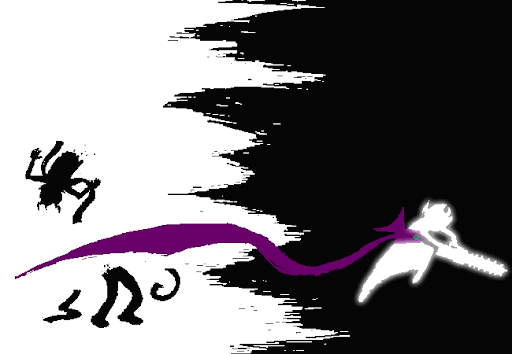

AND THE. AND THE!!!!!
oh my god i am so abnormal abt this comic
#homestuck#text#eridan ampora#land of wrath and angels#homestuck angels#hs angels#does this count as classpect analysis
1K notes
·
View notes
Text
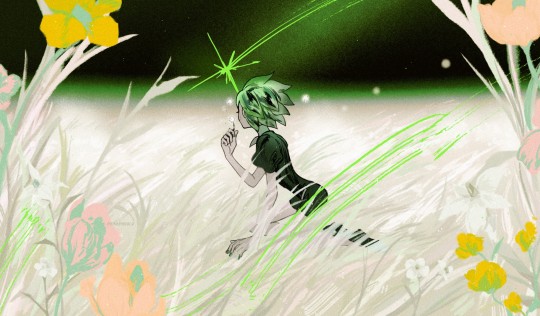
a lifetime of happiness
**hnk ch 108 spoilers**
Can't believe it's already been a month since Houseki no Kuni ended... It's been a ride leading up to the finale but I finished the series with tears welling up in my eyes, and a sense of peace. 😭
The ending was hopeful and meaningful— an unexpectedly lovely conclusion for Phos! 🤧 I love the visual metaphor of Phos and the gems being reborn into "The Pure Land", or known as, The Land of the Lustrous, a purified paradise free of materialism and earthly temptations. These delicate gem flowers holding tiny, unique universes, will be eternally brightened by Phos' radiant existence. With the possibility of other universes, I hope that Phos and the others will meet again and lead more fulfilling lives together!! 🛌💭
The way my jaw dropped realizing Ichikawa ended the last chapter on number 108, the Buddhist symbol of overcoming worldly desires and embracing new beginnings to attain nirvana. SO good...😦 The parallel between big brother and Phos, both on self-destructive, morally ambiguous paths for their loved ones/ideals, was a compelling twist. I love them both... 😢 As Aechmea and Adamant hoped, big brother passed on knowing he helped Phos find happiness. 😭 Wailing...
This series has profoundly impacted me more than I imagined, shaping my perspectives on my own values and the world. Despite it coming to an end, we will always stay connected across time and space, just like Phos!!! 🥺🤍
Thank you, Haruko Ichikawa, for creating such a memorable piece of work, and to everyone who has liked my hnk art and commentaries throughout the years! I'll continue loving and drawing the series for as long as I can. 🙇
#housekinokuni#land of the lustrous#hnk#it was the best possible ending for phos and i love how beautifully depicted the closing chapter was T_T#treasuring it in my heart forever!!!#hnk 108#hnk spoilers#thanks to anyone who follows my other platforms and rereads the same caption lol!#i'd like to eventually compile an more complex analysis now that the series is finished!! maybe after i reread everything <:)#pemprika
778 notes
·
View notes
Text

Floyd in Jade’s lab SR: You suddenly got all silent and froze and it scared me. What’s wrong?
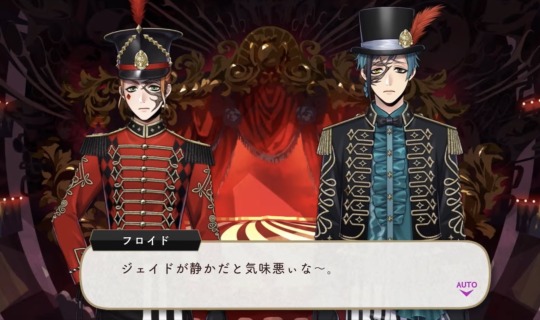
Floyd in Playful Land event: It’s creepy when Jade is quiet…
Jade may be full of nonsense 90% of the time according to Floyd, but the twins (and Azul) are always chatty with each other, especially when sharing stories of their fun experiences, so to not have his brother talking to him must be unsettling.
Famously, Floyd’s unafraid of a lot of things.
But Jade’s silence seems to genuinely scare him.
#twisted wonderland#twst#twst spoilers#floyd leech#jade leech#tweels#stage in playful land#playful land event#character analysis#one of these days I want the tweels to be genuinely worried about losing each other#like I know the sea is dangerous#but even an apex predator has something to be afraid of#and that’s being alone at the top#just a crumb of fear I beg of you Yana
1K notes
·
View notes
Text
ok so. miki’s sunlit garden is the literal sunlit garden where he and kozue played piano together as children. it’s the defining version of this narrative device, and in a way, it’s the most straightforward. miki is leaving the garden and entering the world of teenagers. he is scared of growing up, and he misses the effortless, uncomplicated bond he shared with his sister when they were children, before being inculcated into a world of sexual power and abuse, before his parents divorced and his beautiful nuclear family was rent asunder by real-world complications. i genuinely think every 13-ish year old goes through this grief and a desire to hold onto the past, to remain in this perfect nostalgic bubble through which you view your childhood. it’s probably the most universal and identifiable instance of the motif of the sunlit garden.
then it gets more complicated. nanami’s sunlit garden is her memories of short-haired touga, of her big brother showing her his affection, making her feel special, worthy, and loved. but unlike miki, she doesn’t miss being a part of the ideal nuclear family. for one thing, both she and touga are adopted. of course, she doesn’t actually know that, but it nonetheless problematizes the bioessentialist logic upon which the nuclear family [abuse factory] structure is predicated. secondly, it’s clear that she was always the scapegoat to touga’s golden child. which is why it’s not that she loves her sibling as an extension of her childhood nostalgia, but that her entire value system fundamentally revolves around touga, because he was the only person in her formative years who ever showed her the slightest sliver of affection. and in all her memories of him, he has short hair (like dios, like miki), because subconsciously she doesn’t even want him to be her Prince, her patriarchal savior, she wanted him to be someone who loved her because she inherently deserves love. she does treat him like her prince in the present, but that’s only because it’s how her love for him must take form in ohtori. deep down, she doesn’t want a prince, a lover, or even a brother; she wants a friend who will love her for nothing. but she has no way of expressing that, not in a world that claims true friendship is for fools. so instead she values him for their biological ties, for his status as a kiryuu, for his patriarchal role as the eldest son in their perfect nuclear family. and she refuses to acknowledge how she demeans herself in the process of worshipping him, how she’ll drown herself and cook herself and cage herself, debase herself and dehumanize herself for his illusory love. and that is what the sunlit garden means to nanami.
as for saionji, the sunlit garden also constitutes his memories with touga, of a “before” that is much more definable in the sense that there is clearly a moment where it becomes “after.” one day they are riding their bike through the rain after kendo practice, and they decide to take shelter in a church. and saionji sees touga become someone he fears and also envies. someone who wields the power to project something eternal, to inspire, to save. and he exerts his power in a subtly violent way, by transgressing invisible boundaries. saionji cannot harness that power, so he attempts to exert it clumsily, through immediate, obvious, physical forms of violence. it never quite packs the same punch as touga’s manipulation, no matter how hard he tries. but what saionji really longs for is not to possess touga’s power, but to go back to the way things were before touga decided he wanted power. touga thinks true friendship is for fools, but like nanami, all saionji wants is to be touga’s true friend. and isn’t that just tragic?
of course, that’s not all saionji wants. but his desire is complicated by the fact that he clearly also resents the sexual acts he is being put through by touga, even if in other circumstances, it could be what he wanted. juri’s situation, her sunlit garden, is similar to saionji’s in this respect. all she wants is shiori, but she doesn’t want the shiori she is being presented with. she wants the shiori from an illusory idealized past in which they were true friends, before shiori betrayed her and revealed her ugly feelings in the process. like miki with kozue, nanami and saionji with touga, utena and anthy with dios, mikage with mamiya, juri is idealizing a version of the object of her affection who never really existed. shiori’s ugly feelings were always latent. unlike miki’s sunlit garden, nanami’s flashback to touga’s party and sea of photographs, or saionji’s memories of touga tenderly wrapping his hand, juri does not even have memories of shiori that are not defined by her betrayal. yes she has shiori reaching out, holding a rose, saying “believe in miracles and they will know your heart,” but it’s an obvious fiction. juri doesn’t know shiori at all, and the shiori juri knows is not the shiori she loves. the sunlit garden is always a garden of illusion.
utena’s sunlit garden, which opens many episodes, is perhaps the most obvious example of this fact. she completely rewrote her own formative memory to better suit the dominant patriarchal narratives she was forced to adopt all her life. and you can say that akio actively tampered with her memories, but functionally speaking, that’s the same thing. even more so than the others, her sunlit garden is a palimpsest; she idealizes a past and a prince that never actually existed. sure akio and anthy exist, but her “prince” is not either of them. the locus of her will to live, that eternal thing, is a fiction. but her desire to help others in need is genuine. and that is what differentiates utena’s sunlit garden first and foremost. it is not founded on a selfish desire to cling to a perfect past of illusion, but on the selfless desire to keep moving forward in hopes of a better future. they all want to hold onto something eternal, including utena in her desire to keep her parents with her, and all of those desires are perfectly understandable and eminently sympathetic, but utena is different because that day that akio showed her anthy’s suffering, utena’s desire shifted from a memory to a telos.
mikage’s sunlit garden thus becomes a cautionary tale to all the members of the student council who wish to live in a memory, perfectly suspended, pinned in place like a butterfly on display. just as a caterpillar must become a butterfly, a child must enter the world of adults. mamiya is beautiful because he has the luxury of dying young, of being immortalized on a carousel, of never losing his innocence. mikage is what happens to people who idealize eternity through escaping into nostalgia. the world keeps moving on without them, and they become ghosts, trapped in a past that no one can recall.
so what of akio? he uses people’s sunlit gardens against them, he manipulates time and memory, feeds off nostalgia and the grief of lost childhood. he cultivates his garden to resemble golden days, and as he invites you through his gates, ensnares you. so what does that mean, when his goal, too, is to achieve eternity? above all he wants to forge a sword that will break through the closed gates and reinstate his former glory. of anyone in ohtori, he is the one most deeply entrenched in his oh so cozy coffin. for all that he knows his promises to be illusory, he also clings to that logic, he also mourns dios. he longs for his golden days despite knowing that they’re untenable, despite being well aware of the toll it took on anthy. and even fully aware of the extent of his exploitation, of the fundamental illusion of eternity, he still attempts to attain it, he still instantiates himself in a cycle on the carousel, condemned to ghosthood, a butterfly pinned in place.
finally, we must look to the absent figure, the outlier. what, or rather who, is touga’s sunlit garden? the movie tells us it is utena, that he embodied the princely role in the truest sense and that this is his deepest aspiration. but i don’t know if that’s necessarily how i read him. anthy and touga are foils, two sides of the same coin. anthy doesn’t have a “sunlit garden” per se, because she has long given up on the idea of returning to a time when she loved dios, before the swords of hatred pierced her heart. but she has a literal sunlit garden, and her role is to tend the flowers in it and never leave. she has a literal coffin, guarded carefully in the chambers of her heart. anthy knows better than to cling to an idealized past, but still, she cannot find a way to move forward. so she gets stuck in a circular present, where both past and future are illusory concepts. it is not enough to simply know that the past is gone, one must also strive for a better future. it is why utena and anthy’s promise to drink tea and laugh together in ten years is just so powerful within ohtori’s timeless walls. i’d bet anything that touga also doesn’t have an idealized past. if, again, we use the movie to inform our understanding of him, he was always aware of the abuse that pervaded his world, he was never an innocent. but instead of desiring reform, like utena, of wanting to save those suffering, he wants to be the one inflicting that suffering as much as possible. to cope, he accepts his abuse as a necessary consequence of existence, and assumes that anyone capable of abusing him is simply more powerful, and thus deserves to exert their power over him, just as he deserves to exert his power over those less powerful than he is. so like anthy, he doesn’t have a sunlit garden, but he has a coffin, and a garden, and a carousel. and like anthy, he must choose for himself whether he wishes to remain a complicit victim, or to leave his cozy coffin and find a way to move forward. and that, only time can tell.
#analysis#manalysis#u#UMM. THIS POST WAS SUPPOSED TO BE ONE PARAGRAPH????? OOPS#it’s 2 am now. fuck#the sunlit garden#miki#nanami#touga#saionji#utena#anthy#akio#mikage#juri#shiori#mamiya#dios#this was just me rambling as a way to organize my thoughts#it’s incredibly stream of consciousness#i am in no way trying to make an argument here im just trying to like. parse my thoughts on the sunlit garden#(the land of illusion….. anyone else hongloumeng pilled.?)#long post
319 notes
·
View notes
Text
It’s funny when you think about how much trouble Lilia had with Grim in the rollercoaster ride, especially after he raised Malleus and Silver. 😂😂
But it makes sense! Of course he would have trouble with Grim.
Malleus, while he did have his outbursts, had to learn quick how to act like a prince and was isolated. Not only that, for his own freedom he had to mature and become powerful to visit Lilia and Silver as he pleases. 😭😭
Silver, of course, was a wonderful baby to raise. Well behaved and loving, he also had the Zigvolts take care of him. And we have seen those memories of how precious he was. 💞💞
When he started training Sebek, Sebek respected Lilia and wouldn’t cause him any trouble either knowingly.
So Lilia really, technically, didn’t have children like Grim to deal with. None of them really caused him as much trouble as Grim did in that rollercoaster ride. So no wonder he was so frazzled at the end of the ride 😂
Good. I’m glad Grim caused trouble. He needs to realize how easy he had it with Malleus and Silver. 💞😈
(Also love how he acknowledged that Prefect must have a hard time too always dealing with Grim)
#Hana queues#hanas thoughts#twst analysis#lilia vanrouge#twst silver#malleus draconia#silver vanrouge#twst playful land
271 notes
·
View notes
Text
Can we appreciate and analyze how impeccable Vash’s skills as a marksman is bc I hadn't noticed anyone talk about it in length and this gif literally drives me insane:

Content warning: mentions guns / gun and shooting below the cut because otherwise this analysis would be moot.
This is coming from someone who used to only shoot air rifles for sport like how you'd see it in the Olympics with paper targets!
Ok so as I’ve said I've shot guns before (not at anyone ya sickos) and believe me when I say that Vash has such a good steady aim his arm doesn’t even bend when he moves it - he moves it from the shoulder/ his waist to keep that arm straight and relaxed as possible, which is crazy because that gun looks like a BRICK made of solid metal. There's no way that thing is light, there's definitely some weight to it, but the way he moves it is smoother than most people I've seen lift a credit card.
Now it’s not unusual in sport to have at least some tiny weight on the end of the barrel to keep it steady and act as a counterbalance but that’s like Olympics, not a fight. Vash may be superhuman but I don’t think carrying a cross like the Punisher would make fighting any easier, so it’s safe to say holding a decently heavy chunk of metal filled with lead isn’t easy either (I’m pretty sure the humans we’ve seen so far held their guns with two hands either due to weight or stability and they're not so smooth anyways).
So him tracking someone with a gun like that in only ONE HAND is kind of impressive even at that close range bc it doesn't matter how many times you hit your mark, your barrel would NOT be as steady as Vash in that gif unless you're this gif of Kobeni from CSM:

Even that scene in episode 3 when Vash is aiming at Knives (which I can’t find a good gif of) he doesn’t move the barrel at ALL until he has to lift it and follow Knives’ head. No shaking, no wobble, not even the SLIGHTEST figure 8 you’d normally get when you aim down a barrel - it’s a smooth turn of his wrists following Knives’ head up.
And that’s all from EXPERIENCE. Look at the two gifs below:
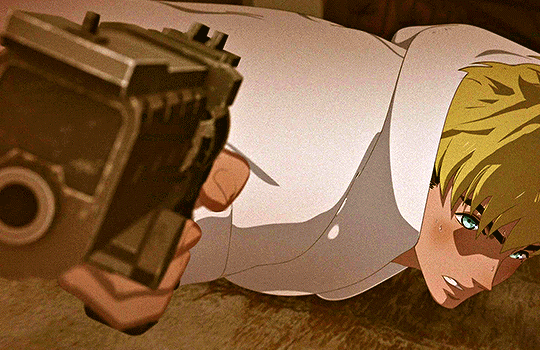

You can literally see how much he’s improved since he lost his arm - he’s expectantly super wobbly compared to the last gif in episode 2. He notably doesn’t “force” the gun to stay in one spot and aim where it needs to be - he raises it then let’s it “settle” on where he’s aiming to shoot before firing. A good shooter knows how to aim and take the shot before they lose the target w/o moving (called “following through”), but a great marksman knows that when it comes to shooting you should never fight against the body’s natural tendencies to move the way it wants to even when you’re aiming at something because you’re less likely to wobble or move when your body is relaxed and comfortable. Moving it away from that position will cause you to quiver and inevitably try to return to that same comfortable position against your will. That’s not just something you pick up on naturally - you have to LEARN that shit.
Which means Vash literally took the time to either completely unlearn every single one of his body’s natural ticks in order to shoot like a pro OR he learned how to work along with each one so his aim was always on point. Either way, it took him 150 years of practice to reach that level and it definitely paid off for him I think!
There’s a bunch of other ticks I noticed, too, like him keeping his trigger finger on the side of the gun if he’s not aiming to shoot anything in that moment but still has the gun in his hand so he doesn't accidentally misfire:


Or how he never keeps one eye closed bc the twitching WILL make you shake and lose focus so he always keeps both eyes open when aiming so he sees better:
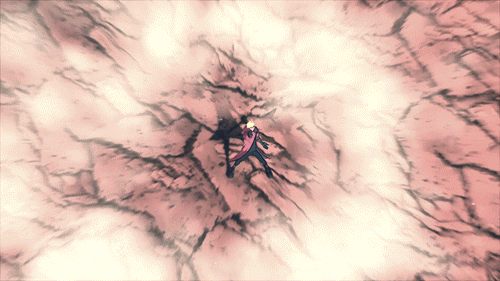
But this post is long enough as is and I think we all get the idea that he’s that fricking good at using a gun.
TL;DR Studio Orange did a fantastic job convincing me that Vash is an INSANELY GOOD marksman and this is coming from someone who used to shoot air rifles for sport and had an incredible coach who would also agree with me and say this guy’s aim is surreal if he ever watched this show. Also his reload speed is absolutely demonic too like what the actual hell-
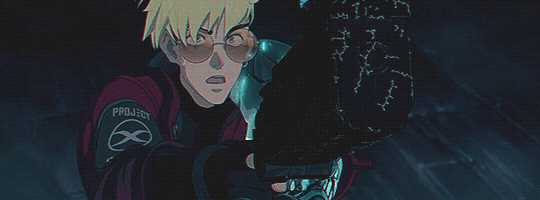
EDIT: added that scene from episode 3 just to show you guys what I meant (sorry it's low quality but you get it!!! Also the fact he's keeping his finger on the trigger bc he knows how unpredictable Knives is and could strike him down at any moment just shows how confident he is at keeping his hand steady bc if he were shaking he would DEFINITELY have misfired by now).
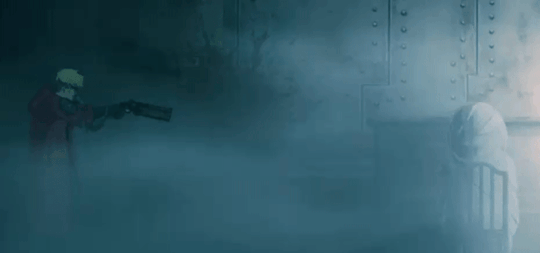
#trigun stampede#text post#vash the stampede#analysis#gun#guns#shooting#marksmanship#seriously if this dude ever shot in the Olympics#I guarantee you everyone there would go INSANE#I used to shoot standing with my feet misaligned and it drove other coaches mad#because not only is it completely against how you’re supposed to be taught how to shoot (feet in one straight line)#but I actually shot better that way and landed bulls eyes consistently#bc my hips dont lie and my waist liked to move it like a blender ig but hey it worked!#anyways i think vash is neat!
1K notes
·
View notes
Text
Steve's breathy little "Easy, easy...." said whilst Eddie is climbing up the blanket rope lives rent-free in my head
#it's a callback to the previous episode#when they were getting the boat in the water and steve was guiding eddie but eddie was going too fast and jerky#but steve's voice is so much different this time#and it's like#why did he even say that with eddie and not with like robin#homie was staring up at eddie and even giggled at his antics when he landed#robin had almost the same line when she landed but steve didn't have the same reaction#gay gay homosexual gay#steve harrington#st4 rewatch#steddie analysis#steddie brainrot#steve harrington analysis#steddie parallels#steddie#bi steve harrington#bisexual steve harrington#steve was falling for eddie#steve harrington brainrot#the massacre at hawkins lab
172 notes
·
View notes
Text
The Land of Immortelles and Iridium
A desolate husk of a world. A mass grave of a civilization, littered with shining silver iridium flowers plunged into the earth as a supposed sign of reverence. A cruel mockery of honor as the warped metal radiates with destructive magic, amplifying all energy nearby to the point of obliteration.
The nails of this coffin world have been planted long ago.
Welcome to LOIAI. The Land of Immortelles and Iridium.
LOIAI is an endless graveyard of dusty hills, smothered skies, blasted out ruins, and the ominous and eternal presence of the iridium immortelles. This blasted world was once a thriving garden, an eternal paradise of eden, and remnants can still be found. Sequestered in burrows and caves remain the last vestiges of nature. Hauntingly still gardens that have long since withered. These remains form the root and stem of the immortelles above.
It's a mystery as to how exactly the world fell into ruin, but even the most cursory glance will lead you to the culprit. The iridium flower sculptures poison everything around them, mind, body, and soul.
Corruption made manifest.
There is a peculiar trace of magic that emanates from the flowers, forming a latticework of arcane energy that runs through the earth and sky. While other things may crumble, the iridium composition allows it to remain. Twisted and eternal. It not only brings misery, but seems to feed on it in return. The more anger, hate, and pain it finds, the more they grow.
But it was not always this way. Beneath the waves of ash, buried far below the crust of the world, deep roots cross and intersect, leading to places foul and unknown. Whatever great tragedy swept across this land, it grew from deep, deep underground… down where the light of Skaia will never reach. Down into the suffocating darkness where only the most ancient of horrors lie.
The Maid of Rage must scour the land, fending off the constant force of corruption from the iridium immortelles, and combat the constant source of pain, misery, and anguish radiating out from the core of the planet. Only then, when they find the heart of suffering, can the world be made whole again.
But it’s an awful long way down…
Denizen: Lyssa, Greek goddess of rage.
Features
The Roots of Misery
About halfway through the top layer of the planet one would find something of a cage. A vast, interconnected sprawl of metallic wire and bars, keeping anything below in and anything above, out. These roots are where the iridium immortelles spring up from, drilling their way to the surface to spread ever further.
These roots form a dense and treacherous biome and mark a turning point for LOIAI. While the world above is certainly dreadful, down below is so much worse. The Deep Dark. The distance between Hades and Tartarus. While the world above may be a graveyard of destructive magic, down below is an eternal prison, containing all the evils and sorrows of the world.
Here there are monsters.
The Pit of Despair
A place just beyond the precipice/cage that is the Roots of Misery. A yawning void, a chasm of incredible space, far larger than anyone would ever expect. It is the end. The gaping maw of infinity. Time and space seem to fall away here, unwinding oneself from distance, direction, and duration. Clocks and compasses cease to function and, more often than not, shatter entirely.
Everything about the pit is oppressive. The heavy weight of the air, the grim shadows that lurk around each corner. Even many of Sburb’s functions such as instant messaging and alchemizing can refuse to work down there.
There is only you. And the horrors that the Pit holds.
Good luck.
- - -
This post was commissioned by @apogender ! If you want to commission me or support my content, you can find me @ https://ko-fi.com/kesscal or over at https://linktr.ee/Skywhale09 !
36 notes
·
View notes
Text
Many people like to talk about how The Land Before Time (1988) tackled themes of prejudice and segregation, but have you ever considered that it’s also a movie about five weird kids finding community with one another?
Spike is a “late hatcher” that was abandoned by his own herd.
Petrie’s a nervous neurodivergent who speaks entirely in third person.
Ducky’s a much more hyperactive neurodivergent that loves to talk a lot, but doesn’t fully understand social boundaries.
Cera’s a kid that had a pretty strict upbringing, because she was taught from an early age to never show fear, and when she does, she tries to hide it.
Littlefoot was the last surviving baby of his herd, and never met any other kids before seeing Cera for the first time.
#I know I kinda mentioned it in my found family meme#but it bears repeating because the original Land Before Time hardly gets any credit for being a profound and genuinely good movie#and I hate how Rotten Tomatoes condescendingly calls it “too cutesy for older audiences”#the land before time#don bluth#film analysis
239 notes
·
View notes
Text
Houseki no Kuni Chapter 107 Thoughts: Goodnight, Sweet Phos...
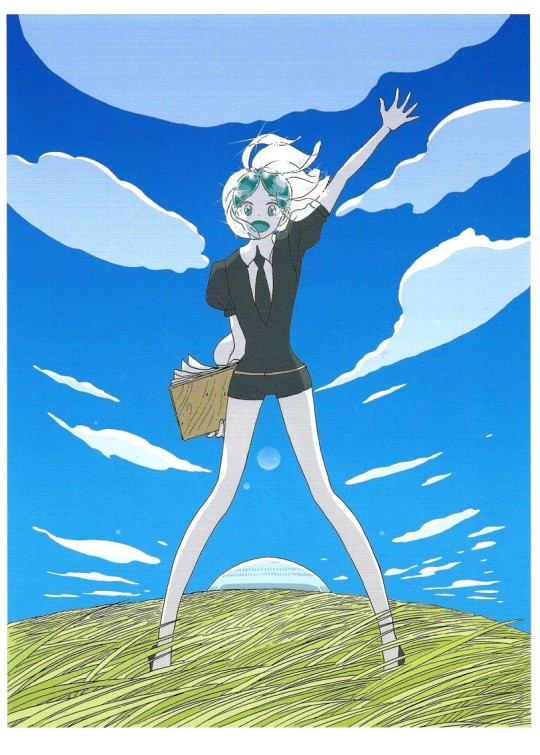
Hello everyone! Sorry for the delay with this post. I originally intended to finish it and post it on Wednesday, but you know.... life happened.
Another month has gone by and now we're on our second to last chapter for Houseki no Kuni. That's right; it's been confirmed that the next chapter will be the last chapter. Can you believe it? If you've seen my previous posts, I'm sure you have an idea of how I feel about this news.
But that'll be for the end of this post. For now, let's talk about this chapter! I don't know how long this one will be, but I'll still warn you that it might be longer than intended, which is the norm for me. This post is a bit too messy for my liking so I might end up making some edits to it later. For now, I just want to have it posted.
As always, please feel free to share your own thoughts in this post! Here we go!
Visual Storytelling Through Change in Style
The first thing I want to talk about is the visuals for this chapter. It greatly contrast with the visual style of the previous couple of chapters. In those chapters, the art was loud, intense, and chaotic, and yet mesmerizing and immersive. The heavy use of black, sharp lines and patterns emphasizes on the harshness of the changing environment. And in many of those page, Phos looks so small, as they are literally being consumed by their surroundings. Even though there were many panels where Phos, Eyeball, or the pebbles are the focus, the background is still very overwhelming in comparison.
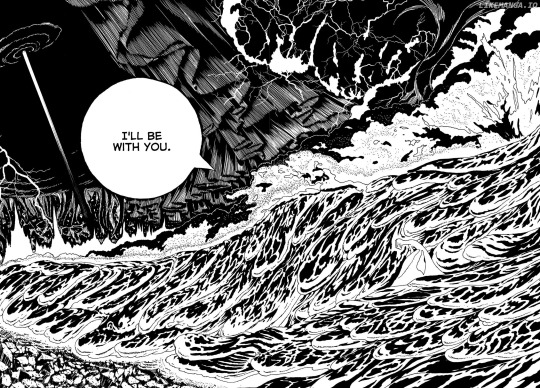
Now contrast that with most of the visuals in this chapter. Most, if not all, of the intense visual motifs from the previous chapters are gone; no sharp patterns, black is subdued significantly, and the background isn't overpowering the characters.
The intensity of the visuals were cut back significantly and were traded in for simplified line art, heavy use of the white negative space, and soft hues that make everything airy and dream-like. This is especially true during Phos's sequence. I like how there are very few thick continuous lines in the artwork. These illustrations are mostly made up of light, loose broken up short lines that create abstract structures. And I like that as the regression continued, Phos's design simplified to the point that they were just a small abstract face.
This art style literally and metaphorically showed us the deconstruction of Phos. It's so simple, and yet so impactful.
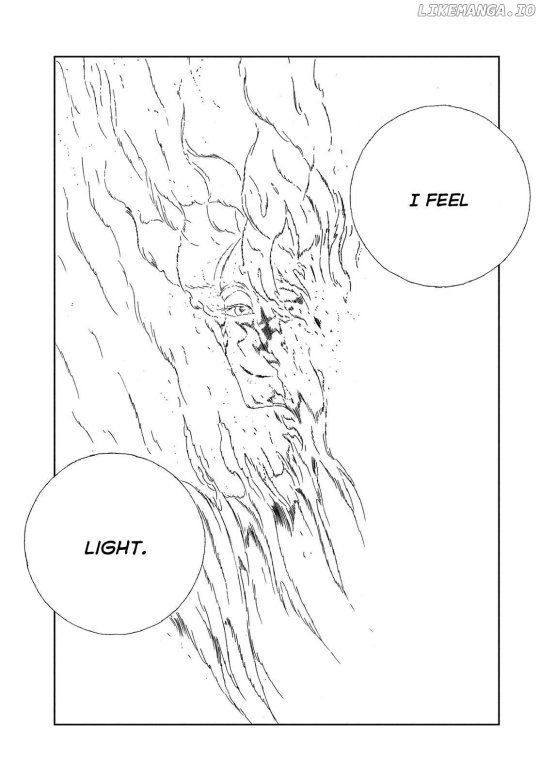
This is also the case for the last two pages.
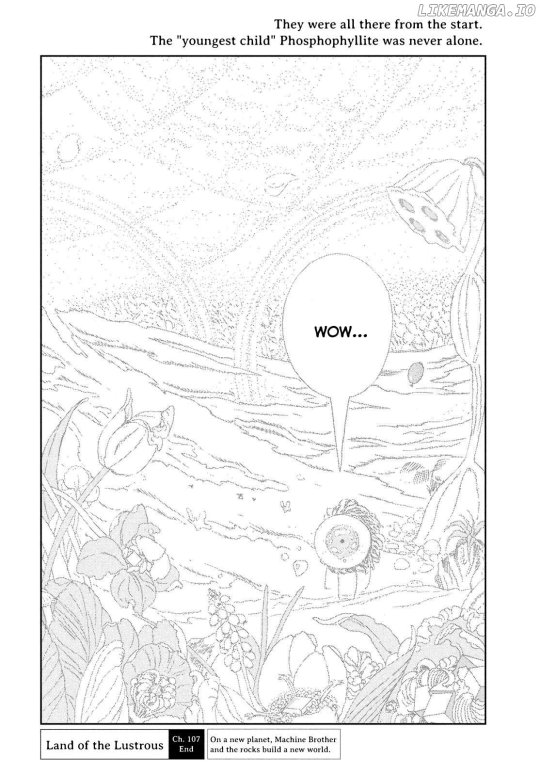
The change in visual tone does a nice job emphasizing the literal and figuratively change in scenery. To be more specific, the drastic art style changes can symbolize the final metamorphosis of the remaining characters and the story itself. With Eyeball and the pebbles, the style emphasizes how they've transitioned to a whole new place in a literal and allegorical sense. And with Phos, they're style does the same by emphasizing on the deconstruction of their being during their final moments.
I apologize if what I said was confusing (I also got myself confused for a moment haha) But I'll just end this section with this: I liked the art in this chapter.
Now then, we should jump into the meat of this chapter....
Phos's final curtain call.
Phos Can Finally Rest...
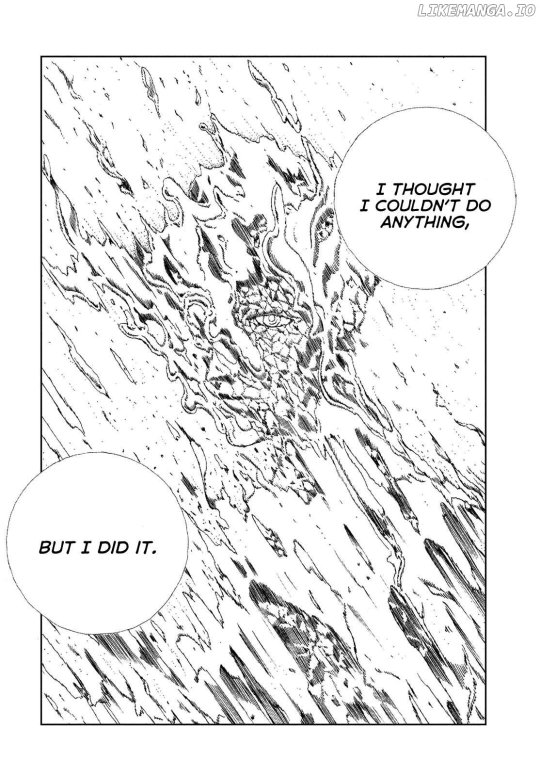
Like I stated before, I found Phos's pages really beautiful for different reasons. In terms of visuals, it's nice seeing some softer imagery after having nothing but sharp, chaotic ones. And story wise, it's nice to see Phos finally letting go and feeling fulfilled.

They are finally free, for real this time. Free from heartache, pain, existing. Phos is no longer held back by the sorrow they had been carrying, and they are free of regret.

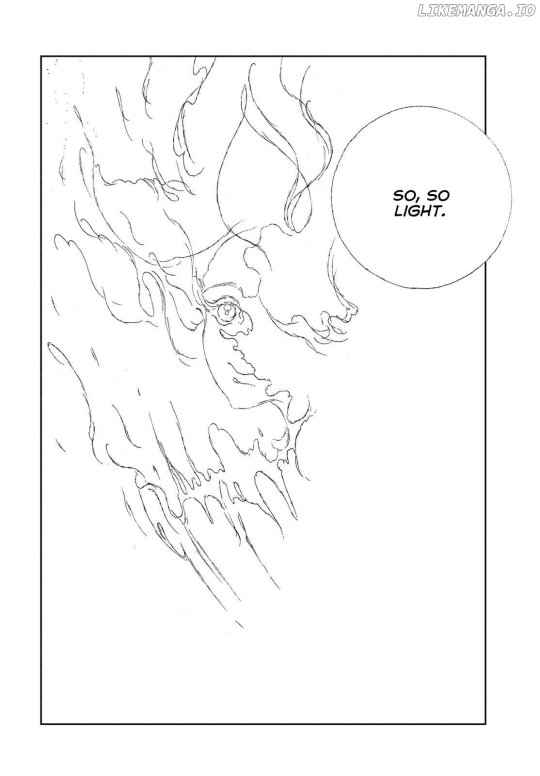
They are finally at peace.
And would you look at that? We got to see Pho's original face one last time. And they were happy.
Good for them.
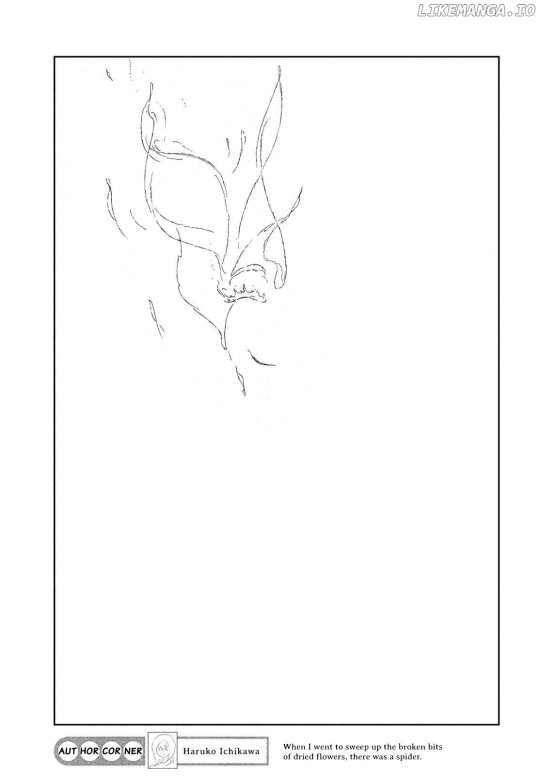
Before going to the next section, I want to quickly talk about this page:
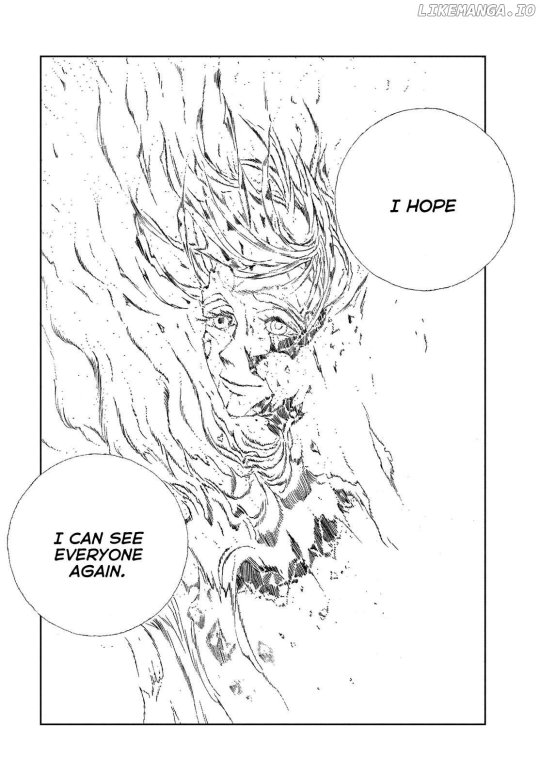
When I first looked through the spoiler tag for the previous couple of chapters, I remember seeing some posts from people who seemed unsatisfied with how the story progressed. From what I understand, many of them didn't like that Phos decided to forgive the remnants of humanity. With this latest chapter, I'm sure there are fans who were also not happy that during Phos's final moments that they are thinking about wanting to see their old families again. I can understand the sentiment, though I'm not surprised with this development.
Despite everything that had led the story to this point, Phos did not hate their old families. Yes, they harbored malice towards them during different points of the story, and it would have been justifiable for Phos to punish them along with the other remnants of humanity came to them to pray. But instead, Phos chose to forgive and free them.
I originally saw Phos's actions as their way of finally cutting ties with their families and relieving themselves of the emotional baggage that they burdened them with. But it's been hinted for a while that despite everything, Phos still loved their families. And the fact that Phos wishes they could see them again solidifies this fact.
Though I can't say if I like this revelation or not, I still find it interesting. But again, I can understand if some readers disagree with Ichikawa's writing decisions. If you have your own thoughts about Phos's final moments, please feel free to share them!
But regardless of everything, I still think this was a wonderfully fitting send off for Phos.
But I'm not done talking about Phos just yet.
And Start Anew...
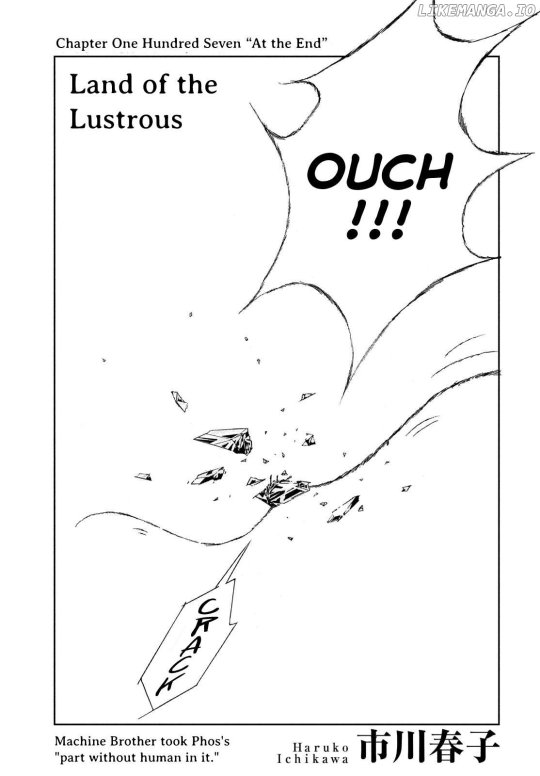
I'll admit that having the first image I see be Phos's last gem piece shatter was not the welcoming image I wanted to see. For a moment, I thought my hope that there was a chance the small piece of Phos would grow sentience and live a new life was shattered (haha.)
But hooray, for that theory became a reality! Despite Phos's last piece breaking up again, a small bit remained and is evidently showing signs of life. It was wonderful how the pebbles immediately recognized that small piece as their brother, showing once again how open and welcoming their are. Small Phos is so lucky.
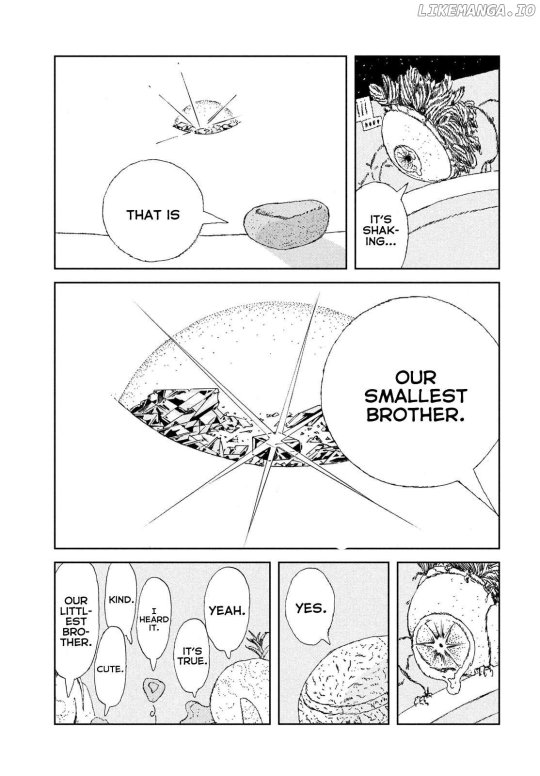
And how ironic is it that this Small Phos is considered the smallest, (in some ways) youngest, and most fragile new member of this new family... much like how Phos was with the gems at the beginning of this whole story. (I know that Phos was the same height as the other gems, but because of their makeup and position within their society, Phos can be considered less significant or "smaller" than everyone else)
Hm. With that thought in the air... I hope the parallels end there and this doesn't mean that this small and untainted piece of Phos won't be subjected to a similar treatment of their predecessor, right?
...right??
Nah, it should be fine....Unless Aechmea somehow comes back-
Created Their New Path: Final Act of Defiance?
The second to last thing I'd like to talk about is this page because it had me thinking about few things.
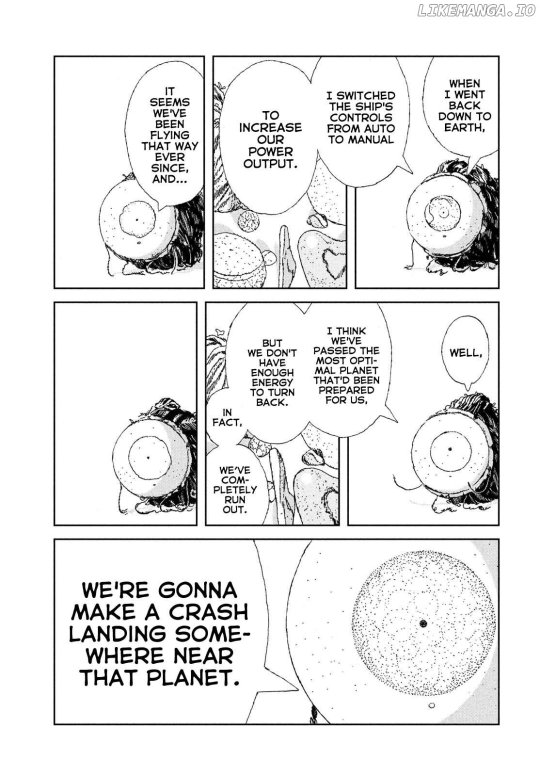
It made me think back to the previous chapters, namely the crazy, nearly perfect plans perpetuated by Aechmea and the Lunarians. It's been emphasized many times how calculated Aechmea's plans were, especially when it came to Phos. He nearly predicted every action Phos would make and kept planning and manipulating accordingly until things go the way he wants. And in the previous chapter, it was also heavily implied that he and the other remnants of humanity counted on Phos, Eyeball, and whatever new organisms they came across, to get onto the Dues Ex Machina ship. In some way, they predicted correctly.
But now I must ask these questions:
Did they also count on the possibility of Phos not entering the ship?
Did they also count on Eyeball switching off the ship's autopilot, manually controlling it, and subsequently crash landing it on a planet that more than likely wasn't the original destination?
For these questions, I want to say no.
It's interesting how even though at this point in the story, both Eyeball and Phos seemed resigned to the fact all of their actions were a result of them being manipulated, even after the perpetrators were long gone. But funny enough, I think that their very last actions were entirely their choice. For Phos, staying on the planet and ceasing to exist was entirely their choice. And for Eyeball, choosing to meddle with the ships settings to grab Phos's last gem piece and boost the ships' output. I don't think Aechmea counted on Eyeball doing that. If Eyeball is correct and they did pass the planet that Aechmea had possibly prepared for them, then this means that Eyeball had in many ways changed the trajectory of his and the pebble's lives, albeit unintentional. This could all mean that are all finally free from Aechmea and his long-game, 4D chess plans.
Phos and Eyeball have finally and truly defied Aechmea and humanity.
...BUT THEN AGAIN.. there's always that dumb chance that this was ALSO somehow part of Aechmea's plan. I highly doubt it, because that would be very ridiculously convoluted, even for this story. But then again, you never know with this author.
But for the sake of this post, I want to believe Phos and Eyeball came out on top in the end by intentionally and unintentionally forging paths that wasn't previously made for them. Even though Phos's final choice was somewhat influenced by the professor, it still felt like it was truly their decision.
I hope this doesn't unravel somehow with the final chapter.
Speaking of which-
The Final Stretch...
I can't believe it. This story is about to end. We'll finally almost done and what a journey it has been. I can't believe I started getting into this series almost over 6 years ago. Many things have happened since then, and during this time, this story had sent me on such an emotional rollercoaster. Though there are many things within the story that I wish was different or handled better, I still think this was a very wonderful and thought provoking story.
Now Ms. Ichikawa has to stick the landing. This could make or break this series.
After everything you put us readers through, I hope the true finale will be worth it.
#houseki no kuni#land of the lustrous#hnk#hnk spoilers#hnk phos#hnk spoiler#lotl#hnk meta#lotl spoilers#hnk analysis#hnk chapter 107#hnk phosphophyllite#hnk manga#hnk thoughts#story analysis
58 notes
·
View notes
Text
Screaming from the crypt (or how the past haunts the present on Midnights)
I know it's been discussed so much since Midnights came out but just.
I love how there is such a clear narrative throughout the album (and perhaps especially on the 3am/Vault tracks). About questioning and regret and choices and coming to terms with all of it. It is one long story about how we're all a mosaic of the choices we make, each one taking something from us and leaving something else in its place.
(And now a disclaimer: I'm looking at this mostly through a narrator/subject lens, and trying not to dive too deeply into real-life events or speculation except for in a general sense. For this purpose I like to look at the body of work as art, like literature, because I find it makes it easier to see the common threads in the different songs and cohesion in the narrative.)
In looking at the 3am+ tracks in particular, it's fascinating how some turns of phrases or themes repeat themselves in different songs, in different contexts. (I'm only focusing on the non-standard tracks because there are too many songs and I'd be here all day but I bet I could do a part two lol.) I know many people have pointed out the parallels throughout her discography already and I’m not saying anything groundbreaking by writing this, but I love how these parallels run through in the same album, because it makes it seem like it's one long story, or at least, one long rumination on many different stories that are coalescing into a single narrative.
Battle (let’s go)
For instance, the one that jumped out at me when I started writing this post the other week was, "Tore your banners down, took the battle underground," in The Great War and "If clarity's in death, then why won't this die? Years of tearing down our banners, you and I," in Would've, Could've Should've. It's a story about staying stuck in the same cycle of reliving trauma and coping mechanisms and bad habits over and over again and fantasizing about how taking the “antagonist” out and gaining the upper hand for good would bring closure (WCS), but the truth is that nothing ever will. All that cycle does, though, is repeat itself in other situations, and in this case pushes someone away the narrator cares for (TGW). The difference is that the imagined battle in WCS is a two-way street in her mind (that is ultimately unwinnable because it was never a fair fight), but in TGW it's one-sided -- she's the one fighting dirty, taking shots, the way she'd been doing in her imagination (or nightmares) all these years. But the person in front of her isn't fighting back the way the person in her mind in WCS would, because their intentions are honourable instead of exploitative.
And that's paralleled in another pair of lyrics from the two songs, "And maybe it's the past talking, screaming from the crypt, telling me to punish you for things you never did," (in TGW) and "The tomb won't close, I fight with you in my sleep," (in WCS). In both cases, the funeral imagery makes it seem like this past event should be dead and buried in WCS, but it keeps rising from the dead, haunting her no matter what she does and in TGW, another (or perhaps the same?) tomb that won't close keeps unleashing new ways to hurt her and in turn the new person in her life. In other words, the trauma from the past continues to bleed into the present.
(Again from a literary point of view, I'm not saying the events of the two songs are linked IRL, but they're fascinating textual parallels on the album as a string of chapters, which is why Dear Reader is so compelling, but that's a whole other essay.)
To keep the battle motif going, there’s yet another parallel, this time between TGW’s "[You were a] soldier down on that icy ground, looked up at me with honor and truth," and You’re Losing Me’s "All I did was bleed as I tried to be the bravest soldier, fighting in only your army.” In the former, the subject is laying down his armour in the war she’s projecting onto him, waving the white flag, and she realizes that she’s about to destroy something if she doesn’t put her sword down too. By the time we get to YLM, the roles are almost reversed; at the very least they’re supposed to be on the same team, but in this case she’s doing all the heavy lifting, fighting for their relationship in contrast to his apathy killing it. It’s also pretty interesting (if not outright intentional) that one of the 3am+ editions of the albums starts with The Great War, where they find themselves in conflict (even if it’s in her head) that ends in a truce, and ends with You’re Losing Me signalling the end of the relationship, evidence that the resolution in the first song wasn’t an ending but merely a ceasefire before the last battle.
Putting the rest under a cut because this is waaaaay too long now ⤵️
(There’s also another metaphor there in The Great War with its battle imagery: World War I, aka The Great War, was supposed to be the war to end all wars, because loss on its scale was never seen before and when it ended, most thought never again would the world embroil itself in such battle, the horrors and implications were so devastating. Two decades later, the world found itself in WWII, with an even larger scope and more horrific consequences, the intervening time between the two a period of festering conflicts and resentment leading to some of the worst acts the world would see. Bringing real life into it for a second, there’s something a little poetic, though sad, about The Great War the song being about a fight that could have ended the relationship that they ultimately resolved and was meant to be evidence of the strength of their love, but so too did it end up being a period of détente, the greater battle coming for them years later. But that is not the point of this post.)
If one thing had been different
Another major theme in these editions is pondering the "what ifs?" of life, but I think it takes on even more significance in the broader context of the album in the lyrics of "I'm never gonna meet what could've been, would've been, should've been you," in Bigger than the Whole Sky and the repetition of would've/could've in Would've, Could've, Should've (I would've looked away at the first glance, I would've stayed on my knees, I would've gone along with the righteous, I could've gone on as I was, would've could've should've if I'd only played it safe, etc.) In both songs, the narrator is mourning an alternate course their life could have taken* and questioning what they could have done differently, in the aftermath of trauma and loss, and the regret that comes with that loss, and with the loss of agency in the situation because ultimately it was never in their hands. In an album full of questions, wondering about the path not taken, or the forks in the road that have led to a different version of your life, it's digging deeper into the contrast of choice vs. fate, action vs. reaction, dwelling on the past vs. moving on. When you're supposed to let go of the past, what do you do when it is holding your future hostage?
(*I know there are different interpretations/speculation about BTTWS which I am not getting into on main. I'm just saying that whatever the song is about, it's grieving something that never came to be. The literal origin of the song is less important to the album than the sense of loss it portrays. Whatever the inspiration is, it's crafted to tell part of the story of Midnights of ruminating over how, to borrow from her previous work, if one thing had been different, would everything be different?)
(Also I was today years old when I realized that the words are inverted in the two songs. Apparently I've been hearing BTTWS wrong this whole time.)
There's also an interesting tangent in the role of faith in both songs: in WCS, the events of the story cause her to lose her faith (e.g. "All I used to do was pray," "you're a crisis of my faith,") and question all the things she felt had been unquestionable until that point in her life (e.g. "I could have gone along with the righteous"), whereas in BTTWS, she questions whether that very lack of faith is to blame for the loss in that song ("did some force take you because I didn't pray? [...] It's not meant to be, so I'll say words I don't believe"). It's like pinpointing the moment her life changed and upended her beliefs (WCS), but as a result then leaving her unmoored in times of crisis because ultimately there's no explanation or comfort to be taken from what she used to hold true before that (BTTWS). The words she once relied upon to guide her have long since lost their meaning, but in times of trouble it leaves her wondering if that faith she once held then lost could have prevented this pain.
(Shoutout to WCS for being Catholic guilt personified lol.)
To keep on with the vaguely faith-y notions, an obvious parallel is the line in Would’ve Could’ve Should’ve about, “I damn sure never would've danced with the devil at nineteen,” and, "When you aim at the devil, make sure you don't miss," in Dear Reader. All of WCS is about her fighting with an antagonist who haunts her, with whom she wholly regrets ever becoming involved. DR could be seen as a reflection on that fall from grace, warning the audience that if you choose to go after the person (or thing) haunting you, make sure you do so clearheaded enough to be decisive. Again, these “devils” may not be related in real life: the IRL devil in DR could be speaking about her naysayers, or Kim*ye, or Scott & Scooter B, etc., meaning not to cross your enemies until you know you can win. But taking real life out of it and looking at it textually, I am intrigued by the link between WCS and DR, so that’s what I’m going with here. And perhaps that’s even the point in a wider sense; there will be multiple “devils” in your life, or threats to your well-being. If you’re going to commit to taking them down — whether it’s an actual person, or the demons inside you that refuse to let you go — make sure you have the right ammo so that they can no longer hurt you. (Of course, one lesson from these experiences is that sometimes you can’t win, and you have to live with the fallout.)
(Sidebar: I know that “dancing with the devil” is a turn of phrase that means being led into temptation and engaging in risky behaviour, as opposed to describing the actual person. Given the religious metaphors in the song, that could very well be/is the intention, particularly when it’s preceded by, “I would have stayed on my knees” as in she would have continued to follow her faith — in whatever sense that means — had she never met this person, which could also be a more eloquent way of saying she would have continued to be live her life in a way that was righteous (even naive) and seen the world in black and white. Either way, it’s a force she wholly rejects. Like I said, multiple devils, same fight.)
Regret comes up too: in WCS, she says, "I regret you all the time," obviously directed at the person who manipulated her and led to her perceived downfall, citing him as the one impulse she wished she'd never followed, because it won't leave her no matter how hard she’s tried. In High Infidelity, she tells the person to, "put on your records and regret me," and on the surface, it’s like she’s turning the tables, painting herself as the one now causing the regret in someone else, the one inflicting the pain this time. Yet the verse preceding it and the lines following it in the chorus depict a partner who is also emotionally manipulative and vindictive like in WCS (“you said I was freeloading, I didn’t know you were keeping count,” “put on your headphones and burn my city,”). It’s not so much that she’s intentionally harming the person (the way the person in WCS does to her), but rather that the venom in the subject’s feelings towards her seeps through; she’s imagining the way he’s going to feel about her when she leaves, hating her just for by being who she is. (There could be another tangent about how in both songs she’s there to be a “token” in a game for both of the men, who play her for their own purposes.) The regret is dripping with disdain. It’s as though she’s picturing how the person is going to hate her for doing what she’s thinking of doing the way she hates the person who first hurt her.
Sadness, unsurprisingly, shows up in a few lyrics. In BTTWS, “Everything I touch becomes sick with sadness,” sets the scene of a person so overcome with grief that it permeates everything around them; they cannot see their way out of it and feel like the fog will never lift. In Hits Different, it’s, “My sadness is contagious,” the result of a breakup where the person’s grief again touches everything and everyone around them, pushing them further in their despair and loneliness. The reason behind the grief in either case may vary, but regardless of the source, the feeling is overpowering and isolating. They may be different chapters in the story, but the devastation is hauntingly familiar. (As is a recurring theme in Midnights as a whole: there are situations and feelings that present themselves at different points in her journey and colour in the lines in different ways along the road. Like revisiting an old vice and realizing the hit isn’t quite the same as it was in the past.)
Death by a thousand cuts
She also writes about wounds on this album, which isn't surprising I suppose given that the whole conceit is that these are things that have kept her up at night over the years. WCS is perhaps the driving narrative on this never ending hurt when she sings, “The wound won't close, I keep on waiting for a sign, I regret you all the time,” suggesting that no matter what she does, the pain of this experience has permeated everything she’s done afterwards. (Not unlike the overwhelming grief in BTTWS, for instance.) Elsewhere, in High Infidelity she sings, "Lock broken, slur spoken, wound open, game token," and in Hits Different, "Make it make some sense why the wound is still bleeding.” Again I'm not suggesting they're about the same events; the line in HI is about a situation where a partner crosses a boundary, hits below the belt, picks at an insecurity (or creates a new one) and treats the relationship like it's transactional, opening the floodgates in turn. In HD, the wound seems to be more self-inflicted, where she's pushed the person away. (Over a situation real or imagined she feels she needs distance from.) But again, something has picked at her like a raw nerve, and just like in the past, she's hurting, even in a different time and place and person. Almost like the wounds of the past break open over and over again to create new scars. If one were to extrapolate further, it wouldn’t be the biggest leap to wonder if the wound open in WCS, then torn apart in HI makes the one in HD hurt even more.
(I once wrote a post about how I think as time goes on, WCS is going to turn into one of those songs that will be found to drive so much of her work, because it’s just… kind of the unsaid thesis statement of so much of her songwriting.)
Another repeated theme is that of the empty home and loneliness. In High Infidelity, she sings, "At the house lonely, good money I'd pay if you just know me, seemed like the right thing at the time," painting a picture of someone who may have everything they'd want to the outside world, but in reality feels metaphorically trapped in their home (or at least alone amidst abundance), a symbol of a relationship gone sour and a failure to build connection. She just wants someone to understand her, want her for her, but as she's written earlier in the song, she's just a pawn in the game, a trophy from the hunt. Home, in this case, is lonely, isolated, an emblem of her fears. In Dear Reader, she continues this thread, then singing, "You wouldn't take my word for it if you knew who was talking, if you knew where I was walking, to a house not a home, all alone 'cause nobody's there, where I pace in my pen and my friends found friends who care, no one sees you lose when you're playing solitaire." It's the same idea, admitting to listeners that the gilded cage she lived in kept her distanced from her loved ones and real connection, keeping her struggles close to the vest but feeling desperately lonely amidst her crowning success. She's pushed people away and it may have felt like the right thing at the time, but in the end maybe felt like she was trapped. And when you push people away, eventually they take you at your word and stop pushing back; you’re a victim of your own success at isolating yourself. What starts out of self-preservation then further perpetuates the underlying problems.
(There's another interesting link about "home" also feeling unsafe with HI's "Your picket fence is sharp as knives," which further leads into the theme of marriage/domesticity feeling dangerous, which is a whole other thing I won't get into here because it's another discussion and may derail this already gargantuan word salad.)
In a slightly similar vein, we have the metaphor of bad weather for a rocky road or unstable relationship, in High Infidelity again with, "Storm coming, good husband, bad omen, dragged my feet right down the aisle" and You’re Losing Me’s "every morning I glared at you with storms in my eyes.” They aren’t speaking of the same situation or even same kind of breakdown, but it is pretty interesting how the idea of clouds/storms/floods/etc. play such a role in Taylor’s music to signal depression, apprehension, fear, uncertainty, etc. In HI, I think the “storm” coming is the looming threat of commitment to a partner who makes the narrator uneasy (if not fearful). In this case, the idea of making a life with this person is not one that incites joy or comfort, but instead makes the narrator feel that dark times are ahead if she continues down this path. Perhaps in some way, the “storms” in YLM have made good on the threat in HI in a different way; it’s a different home, a different relationship, but the clouds have settled in regardless, and some of her fears have come to fruition in ways she did not expect. The person she once trusted no longer sees her or her struggles (or worse, doesn’t care), and the resentment and pain build with each passing day.
Coming back to heartbreak, one of the obvious "full circle" moments is the beginning of a relationship in Paris, where she says that, "I'm so in love that I might stop breathing," clearly enthralled in a new love that allows her to shut the world out and grow in private, capturing the all-encompassing nature of the relationship. This infatuation has consumed her in the most wonderful way (in contrast to the sorrow of some of the previous songs), and it feels like a life-altering (or even life-sustaining?) force that is so strong she may forget what it’s like to breathe. (Metaphorically speaking, of course.) By the end of the album, though, in You're Losing Me, that heart-stopping love has become a threat: "my heart won't start anymore for you." In the former, her racing heart is full of excitement, but by the latter, her heart has given out completely under the weight of the pain she bears. (YLM is full of death/illness imagery which I already wrote about awhile ago so I won't hear, but needless to say that song deserves its own essay for so many reasons.) She's gone from the unbridled joy of the beginnings of a relationship to the unrelenting sorrow of its end, two sides of the same coin.
Love as death appears elsewhere in the music too, for instance, in High Infidelity’s, “You know there's many different ways that you can kill the one you love, the slowest way is never loving them enough" and You’re Losing Me’s “How can you say that you love someone you can't tell is dying? […] My face was gray, but you wouldn't admit that we were sick.” Though not completely analogous situations, they both tell the tale of one partner’s apathy (or at least denial) destroying the other. In the former, the partner’s actions (or inaction) are more insidious, if not sinister; in the latter, the lack of momentum (or admission of a problem) is passive. In both cases, the end result is the narrator’s demise; it’s a drawn out affair that chips away at her morale and her health and her sense of self. (Breaking my own rule about bringing in alleged actual events into the discussion, but the idea that the relationship in High Infidelity, which was obviously fraught with unease and even fear, ended in a similarly excruciatingly slow and hurtful death by a thousand cuts as the relationship in You’re Losing Me almost did at that time must have been so painful. It almost feels like YLM is wondering why what used to be a source of light in her life was mirroring a situation that caused her such pain in the past.)
From the same little breaks in your soul
I said early on that part of what is so compelling about Midnights is that it feels like an album about ruminating — on choices, on events, on people — and the two final “bonus” tracks of the album depict that as well. In Hits Different, she sings that, “they say if it’s right, you know,” an ode to the confusion of a breakup and struggling with the aftermath of calling it quits. It’s a line that has always intrigued me, because the typical use of the phrase is in the sense of, “you’ll know when you meet the one,” but here it seems to have a double meaning, a reassurance perhaps from the friends (who later on tell her that "love is a lie") that she’ll know if she’s made the right decision in calling it off, but could also be her wondering if the relationship is right, she’ll know, and want to reconcile. In the final bonus track, You’re Losing Me, she sings, “now I just sit in the dark and wonder if it’s time,” this time leaving no doubt about the dilemma she faces, though it’s no less fraught. She’s wondering, perhaps for the last time, if now is finally the moment to end the relationship for good. They say that if it’s right she’ll know, and now she’s wondering if that feeling inside her (that once told her her partner was the one, which is why it hit differently), is telling her that it’s time to go for good. Wait Alexa play “It’s Time To Go.” These are not only the things that keep her up at night, but the things that play over in her mind like a film reel in her waking hours.
Midnights as a whole is a deeply personal album, as is most of Taylor's work, but the 3am+ edition tracks seem to dig even deeper to a lot of the issues raised on the standard album. Almost like the standard tracks are the things she wonders about on sleepless nights, but the bonus tracks are the things that haunt her in the aftermath. The regret, anger, sadness, grief, relief, even joy— they’re the price she pays for the memories she keeps reliving. Midnights might be the most cohesive narrative of all her albums, and really does feel like we’re watching someone work through her journal over time, stopping short of outright naming those giant fears and intrusive thoughts (except for when she does) but making them plain as day when you connect the songs together, and perhaps never more clearly than in the expanded album. It’s incredible how the songs stand on their own to relay a specific moment in time, but that they are also self-referential to each other (whether thematically or overtly) to weave a larger web over the entire work. We’re so lucky as fans to have these stories and to keep peeling back these layers as time passes. (And my literature-analysis-loving ass loves her even more for it.)
This is obviously by no means an exhaustive list, and I know there are more parallels and probably even stronger links (particularly when you add the standard version into the mix), but these were the ones that particularly struck me and I’m just glad I’ve had a chance to sit with this and think it through. ❤️
#writing letters addressed to the fire#me thinking too hard about taylor lyrics#taylor swift#midnights#long post#lyrics analysis#song parallels#Gabby this one is for you friend <3#here goes nothing#Happy Friday or something idk!#(also i know i said there are things i wouldn’t discuss on main but my dms are open lol)#this is not as structured or well plotted out as I wanted it to be#and turned out to be more stream of consciousness than legit essay#but whatever at least i got my thoughts out there and it can release some plot of land in my brain for other stuff to think over lol#If anyone ever reads this thank you! And I’m sorry?#The best compliment i ever got in school#was when we were doing an analysis of a poem in English lit in college#And i brought something up casually#and my prof went ‘I’ve been teaching this class for eight years and that’s the first time anyone’s ever brought it up like that’#’and that just blew my mind’#and i was like ‘who me?’#so that’s all you need to know about me lol#Midnights: The Great War#Bigger than the whole sky#bttws#Midnights: Paris#Midnights: high infidelity#would’ve could’ve should’ve#Midnights: dear reader#midnights: bigger than the whole sky
84 notes
·
View notes
Text
Yall, its time to ramble about visual/environmental storytelling cause this is silly article is driving me insane.
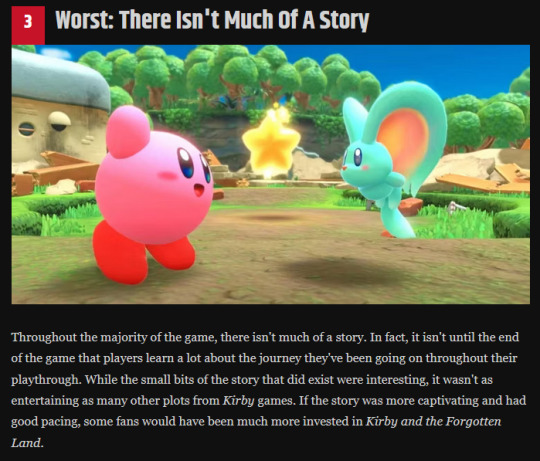
I won't argue for if the game should have had more constant and involved cutscenes like Robobot or Star Allies, but what I will say is that this game is VERY rich in story through the world design. The Forgotten Land as opposed to say the Land of the Sky in TD or the entire galaxy of Star Allies is like, DROWNING in writing and narrative. It builds so much mystery and intrigue through the theming of every world and even individual levels, with exploring both how the people of the land originally lived and how it's being reclaimed by nature and the animals.
I think the closest things maybe is Robobot and Halcandra in RTDL, the former having great little designs that key you into WHAT Haltmann is doing and what makes it so toxic. Halcandra though is the ultimate grand-daddy, the contrast between it and the Lor, and Egg Engines and Dangerous Dinner is full of theming and clues about the nature and history of the planet. AND THAT IS STORY, THAT IS WRITING! Especially when compared to say Star Allies, where most of the levels of the levels are just ye average Kirby themed fluff with little to say about the Jamba or the state they've left the galaxy in.
But when you play through the casino levels of Robobot, as well as delightful theming and level design, you see that Haltmann is erecting literally the most predatory entertainment centers imaginable. When you step off the sleek futuristic Lor into the scrapyards and wastes of Halcandra, you get fun intimidating final worlds, and a good grasp on *why* the people who made the Lor aren't around anymore, and may even start questioning why Magolor made such a great fuss of dragging you to this horrible place.
Music is also deeply important to this storytelling. Each of the factories/towers erected in ever world of Robobot's theme is a remix usually of themes related to older mechanical levels, subtly clueing you into where Haltmann go their technology from. Outside the Lor rather than the comfortable motif of Green Greens is this almost comically suspicious and disoriented theme once you're stuck on Halcandra and returning to Magolor with more doubts about his words. The final level inside of the volcano house a theme that is teasing the twist to come, and the theme for fighting Landia before the big reveal is less triumphant, and more majestic and pensive. Possibly trying to evoke more hesitance than confidence, even if most people wouldn't catch on to that on a first run.
But the cooler thing, is that while Robobot has this cool theming at key levels, and RtDL does at the end, this type of shit is pervasive ALL throughout Forgotten Land. Every world and nearly every level is a unique, well thought-out set piece! You get to see abandoned towns, cities, malls, stores, factories, resorts, and an amusement park, each which serves as more than just a fun location, but a clear picture of the world and the state its in. This intent is made clearer through the music and tone that goes out of its way to not highlight the destruction of these areas but their beauty, wonder, and mystery through the eyes of an clueless animals and our favorite pink alien.
The abandoned Alivel Malls theme is a track as upbeat and peppy as what must've played over it's speakers in it's hayday, because the hustle and bustle breathed back into it by the animals and Kirby just exploring this mysterious complex is just as lively. The theme of the Everbay Coast is peaceful and sunny despite the Holine ruins because it's as part of the scenery to the animals and Kirby as the picturesque palms and sands. And Wondaria!!!!!!!!! OMG WONDARIA WHERE TO EVEN BEGIN WITH EVERY FUCKING LEVEL AND THEME IN WONDARIA!!!
THIS IS WHY I CAN'T TAKE THAT CLAIM SERIOUSLY - y'know when I cried at Forgotten Land? In world 3. Not because of a cutscene or a line of dialogue, but just from the sheer emotion the setting evoked in me. The sweet, laid-back, starry-eyed wonder that it expressed from Kirby mixed with my own sense of nostalgia being aware of what that place was, and how beautiful it was to see it rediscovered and adored by Kirby and the animals of the Forgotten Land. It evokes such a strong feeling of bittersweetness, of existential dread comforted by the knowledge that the simple joys and memories we create places like amusement parks to share will continue on as long as there is life in the world.
And unlike some of my musings about past games, this was explicitly intentional. What truly brought the tears to my eyes was remembering an interview where the devs were explaining how they were trying to keep the tone light and Kumazaki said specifically they wanted to evoke peace and beauty rather than loss.
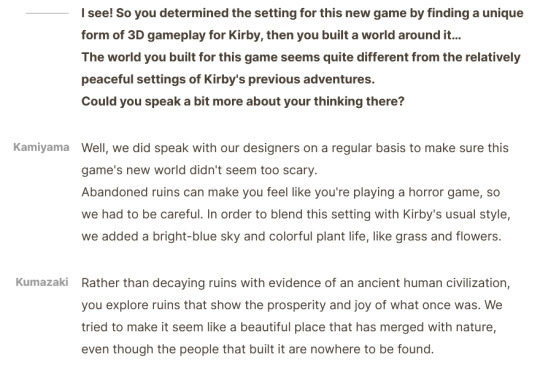
LIKE THIS IS WRITING! This is storytelling, this is intention. It's just subtle, but not at all unimportant, and it ties into the more overarching plot. It raises the question constantly of where the people went that is answered by Forgo, and expresses the dichotomy between the simple innocence of the animals compared to the ambitions of the people who abandoned them and that is now possessing their leader. It creates stakes for Elfilis and Forgo's intentions to destroy everything so beautiful and pure about the current world, but as it absolves the current world of guilt, it puts into perspective JUST HOW LONG Forgo must have been locked away that things changed so much. And as softly as the exploits of the original people are portrayed by the game, knowing their treatment of Eliflis and Forgo as a thing of entertainment and tool for innovation is sickening placed in contrast with it.
Like back to Wondaria, the way it shows how much space travel must have pervaded the imagination and escapism of the people either before or after Forgo's arrival is insanely smart. And it gives me chills in the best way seeing Kirby run around images of cartoon aliens from a civilization who would never meet him. Of Kirby, Elfilin, and Bandana sticking their head into a cardboard cutout of an astronaut meeting an alien, with the text "wish you were here" above in a script they don't even understand. A SCRIPT THE WRITERS MADE FOR THIS GAME SO THAT THEY COULD ADD MESSAGES LIKE THAT INTO THE WORLD FOR KEEN PLAYERS TO NOTICE AND MAKE CONNECTIONS.
Like it's insane. The dedication the Hal Labs has to stuff like this is maddening! It's so sweet and heartfelt and crafty, I'm so pissed off how little respect it gets because people don't understand visual storytelling!!!!! Saying Forgotten Land is light on story is preposterous, it might just be one of the most finely crafted stories the series has had to date, and is just a really solid piece of science fantasy writing in general honestly. It is packed with environmental storytelling that drives me Up The Fucking Wall, Man.
#kirby#kirby and the forgotten land#katfl#elfilis#forgo#kirby lore#shut the heck up#media analysis#GRAAAAAAAAAAAAAAAAAAAH (i love kirby)#im in my “writing is more than text” essay warrior era#this is part of me collecting stuff for a bigger essay though :3c i just got so distracted by this take#also i started this cause i though this article was from a bigger outlet than it was#so now i feel like my intensity is unjustified but idrc cause as i said: warrior essay era#OO ALSO I MISSED TALKING ABOUT THE LATER WORLDS#THE CITY IN WINTER HORNS FEELS LIKE A BIOME THE DELAPADATED RESORTS OF WASTES ARE NOW OASES IN A DRIED UP TROPICS-#-AND THE FUCKING CITYSCAPE OF REDGAR FLOODED WITH LAVA IS LIKE ITS OWN PART OF THE MOUNTAIN ITS SO BEAUTIFUL#its a fun twist on the typical final lava world that also gets to do double duty with evil industrial looking shit ARGFDSH so cool#tag talking
120 notes
·
View notes
Note
I was joking a while back that the actor they have playing KDJ for the orv movie was too handsome for him and a friend who's read orv was like "KDJ is actually secretly attractive!!" And I just felt my soul leave my body right then
SIGHS...
Okay. Buckle in. I'm gonna finally actually address and explain and theorize about this whole...thing.
I'm not gonna cite any exact chapters cause it's like 11:30 and I've got an 8 hour drive in the morning but I'll at least make an approximate reference to where certain things are mentioned. Also, this post is just my personal interpretation for a good bit of it, but it's an interpretation I feel very solid about, so do with that what you will. Moving on to the meat of things:
There is one (1) instance in the web novel that I know of which describes specific features of Kim Dokja (especially ones other people notice). This takes place when members of KimCom are trying to make Kim Dokja presentable to give his speech at the Industrial Complex (after it's been plopped down on Earth). This is when they start really paying attention and focusing on Kim Dokja's appearance since they're putting makeup on him; I still don't think they can interpret his whole face, but they can accurately pick out and retain more features than usual. If I remember correctly they reference him having long eyelashes, smooth skin, and soft hair. These features can be viewed as (stereotypically) attractive.
Certain parts of the fandom have taken this scene and run with it at a very surface level, without realizing (or without acknowledging at the very least) that this scene is not about how Kim Dokja looks. This is, in part, due to not realizing or acknowledging why Kim Dokja's face is "censored" in the first place, and what that censoring actually means. I think it's also possible that some people are assuming the censorship works like a physical phenomena rather than an altered perception.
I'll address that last point first. The censorship of Kim Dokja's features is not something as simple as a physical phenomena. It's not a bar or scribble or mosaic over his face. If that were true it'd be very obvious to anyone looking at him that his face is hidden. But his face is not hidden to people. They can look at him and see a face. If they concentrate on his eyes, they can see where he's looking. They know when he's frowning or grinning. They see a face loud and clear. But what face are they seeing? Because it's not really his, whatever they're seeing.
No one quite agrees on what he really looks like. And if they try and think about what he looks like, they can't recall. Or if they do, it's vague, or different each time. We notice these little details throughout the series. Basically, Kim Dokja's face is cognitively obscured. Something - likely the Fourth Wall, though I can't recall if this is ever stated outright - is interfering with everyone's ability to perceive him properly. This culminated in him feeling off to others; and since they don't even realize this is happening, they surmise that he is "ugly."
Moving on to the other point about what the censorship means: To be blunt, the censorship of his face is an allegory for his disconnect from the "story" (aka: real life, and the real people at his side). The lifting - however slight - of this censorship represents him becoming more and more a part of the "story" (aka: less disconnected from the life he is living and the people at his side). The censorship's existence and lifting can represent other things - like dissociation or depersonalization or, if you want to get really meta, the fact that he is all of our faces at once - but that's how I'd sum up the main premise of it. (The Fourth Wall is a larger part of the dissociation allegory, but that's for another post).
So you see, them noticing his individual features isn't about the features. It's not about the features! It doesn't matter at all which features got listed. Because they could describe any features whatsoever and it would not change the entire point of the scene. Because the point isn't what he looks like. The point is that they can truly and clearly see these features. For the first time. They are seeing parts of him for the first time. Re-read that sentence multiple times, literally and metaphorically. What does it mean to see someone as they are?
This is an extremely significant turning point dressed up as a dress-up scene.
---
P.S. / Additionally, I'm of the opinion that Kim Dokja is not handsome, and he is not ugly. He is not pretty, and he is not ghastly. Not attractive, nor unattractive. Kim Dokja isn't any of these things. More importantly, Kim Dokja can't be any of these things. The entire point of Kim Dokja is that you cannot pick him out of a crowd; he is the crowd. He's a reader. He's the reader. Why does he need to be handsome? Why must he be pretty? Why is him being attractive necessary or relevant? He doesn't, he doesn't, it's not. He is someone deeply deeply loved and irreplaceable to those around him, and someone who cannot even begin to recognize or accept that unless it's through a love letter masquerading as a story he can read. He is the crowd, a reader, the reader. He's you, he's me. He's every single one of us.
#orv#orv analysis#orv meta#orv spoilers#mine#ask#there's also the meta that he is described with these (stereotypically) pretty features as they are about to try and 'sell' him to a crowd#which feels to me like a very pointed way to convey how 'beauty' is commodified. how audiences like 'attractive' characters more#note: made some edits to add in a couple of sentences my brain forgot in the moment so make sure u reblogged those if u do#tag edits for further commentary that isnt strictly relevant to the point i was making:#do i think that this face censorship was executed as well as it could have been? nah.#not that it was like. done Badly. it's followed through to a certain point. its established enough for me to make this post at least.#but i do think it is the one thing in the web novel that SS didn't capitalize on.#like. they still stuck the landing but it was not as picture perfect of an execution as the rest of the metaphorical stuff in orv#also. this (not the face censorship specifically but the 'hes just some guy' point of it all) is one of the big reasons i think that-#-visual adaptions of orv can never quite work. they can do the best that they can with that medium but a lot of nuance is lost-#-simply by virtue of it being a visual medium#i personally think the only way a visual medium could work would be one where they commit to the power move of not showing kdj's face#(until a certain point (of view) that is)#his face is always facing away or out of frame or hidden by someone or something else in the way#commit to the fucking allegory or simply perish
275 notes
·
View notes
Text
Monstro in Playful Land
Alright, so we all know how Monstro Lounge is named after the whale frm Pinocchio right? Well in this wonderful new event, we see the whale in the prolouge : (screenshot taken frm IdolTenshi on youtube)

See that whale? And how the mouth is open w/ a river in it?

Knowing how Playful Land is an amusement park, the whale is probably one of those tunnels where you go in on a boat etc.
I'm probably going to be very, VERY wrong considering the fact I'm posting this theory when the event already started but theories are supposed to be delulu anyways so-
Pinocchio's dad (Geppeto i think) was swallowed by the whale and trapped inside, this makes me think that maybe the plot for this event will include a character(or characters) getting stuck inside the whale tunnel and everyone else has to save them.
I'm thinking that Lilia or any of the 3rd years will be more likely to be the ones to be trapped inside the whale considering the fact that Lilia's an actual father and the rest of the 3rd years are rather fatherly/brotherly as well.
And for the 'Pinocchio' characters, I'm thinking either one or all of the SSR characters for this event(Ace, Kalim, Ortho) will be the ones to rescue them.
#save#twisted wonderland#twst#twst mc#twisted wonderland x reader#twst x reader#disney twst#twst yuu#disney twisted wonderland#twst theories#twst analysis#twst playful land#twst event#twst honest ferro#twst ferro#twst gidel#eeps theories!#eep posted!
102 notes
·
View notes
Text
when sasuke sacrifices himself to save naruto against haku, naruto doesn’t get why sasuke would do that.
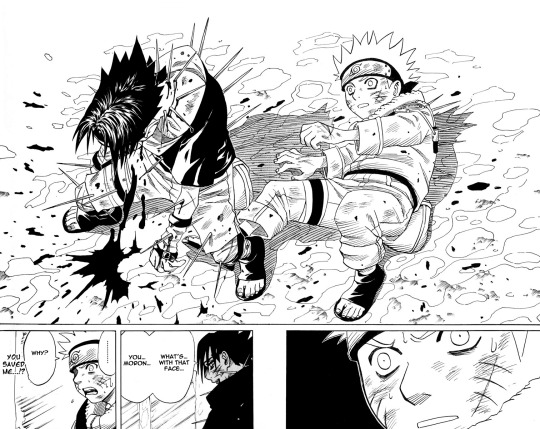

we as readers, have an idea because we are able to see sasuke’s memories with naruto, moments he cherished and found worth remembering in his deathbed (lol).

when sasuke says he can’t let his “precious comrades” die, naruto thinks of the moment with haku. he still doesn’t get it.

at the end of the manga, however, we have naruto teasing sasuke, about not being able to help yourself when “your body moves on its own”
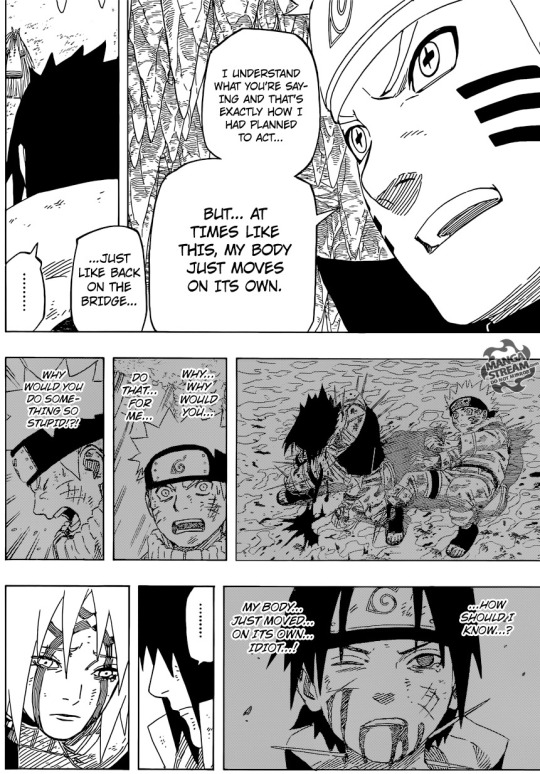

and then in chapter 698, naruto says this to sasuke:
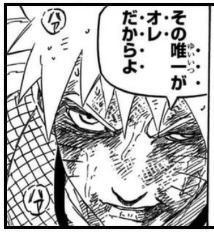
“because i’m (your) only one”.
he gets it now.
#narusasu#sns#sasunaru#naruto#sasuke#uzumaki naruto#uchiha sasuke#land of waves#vote2#naruto analysis#naruto textpost#bella.txt
335 notes
·
View notes
Text
when sam was soulless and he told dean he needs him to be his moral compass because he doesn't know when to care and be empathetic and not say insensitive things etc etc what if i said. what if i said that's largely true regardless of if sam has his soul? dean is consistently the one caring and giving a shit abt things and people and sam consistently will mostly act out of self-interest. he only cares abt finding john because dean asks for his help. he cares because dean cares. and then when he cares on his own, it's because finding john will serve his purposes in finding the thing that killed jess. in scarecrow? dean cares about saving people, this case in particular is time sensitive, if they don't go now those people will die. but sam wants to go to california. sam wants to find john because that's more important to him. so they split up. because this time dean can't get through to stubborn sam who thinks dean is just "following orders" by sticking with this case, when no, it's because dean knows these people will die if he doesn't help them. and he cares about that.
#yes these examples are s1 focused bc that's what's fresh on my mind from the rewatch and i am in s1 analysis land rn#dean thee narrative heart#dean cares#sam and empathy#feel like i need to start cataloging things regarding this#vic.txt#spn 1x01#spn 1x11
37 notes
·
View notes